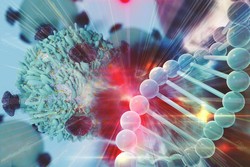Nanotechnology for cancer gene therapy
Undoubtedly, nanotechnology has numerous biomedical applications. The small size and tremendous functionalisation capacity of nanoparticles have rendered them invaluable for the targeted delivery of drugs. Scientists of the EU-funded NANOGENE project wished to extend the utilisation of nanoparticles for gene therapy purposes. In the traditional sense, gene therapy entails the delivery of the wild type gene to replace the faulty or missing gene in defective cells. The NANOGENE consortium was interested in silencing cancer-related genes including oncogenes by delivering anti-cancer siRNA into cancer cells. Towards this goal, various phosphorus and carbosilane-based dendrimers containing ruthenium were synthesised and complexed with pro-apoptotic siRNA molecules. They comprised a core structure with repetitive units capable of interacting with nucleic acids. The presence of ruthenium molecules further increased the anticancer properties of the dendrimers, rendering them an effective tool to treat the different types of tumours. In addition, scientists generated dendronized single and multi-walled carbon nanotubes with cationic dendrons on their surface as promising tool for siRNA delivery and characterised them by various analytical techniques such as nuclear magnetic resonance, mass spectrometry and fluorescence. Overall, the size of the complexes and their stability in time and against nucleases was studied alongside their uptake by various cancer cells. Results indicated substantial differences in uptake efficiency and stability depending on dendrimer nature. Ruthenium dendrimers served as non-viral vectors to deliver siRNA into the cancer cells while also protecting them from the action of nucleases. These novel carriers were up to five times more effective vehicles compared to standard transfection agents and functioned even in the presence of antibiotics, serum or serum proteins. Regarding cytotoxicity, scientists found that at low concentrations, metallodendrimers were well tolerated and non-toxic but induced significant cytotoxicity in cancer cells. Collectively, the NANOGENE project produced gene delivery agents for silencing oncogenes or other cancer-associated genes. Whether used alone or in combination with other anti-cancer regimes, the NANOGENE dendrimers could prove beneficial in treatment for cancer.







